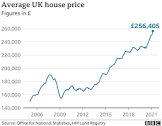- Eyes right… - 26th February 2026
- Opposites attract - 26th February 2026
- Upset coffee - 25th February 2026

During 23 years with the BBC, and a 41 year journalistic career (when he was trained to use clear and simple language, avoiding jargon), for our Editor, Welshman Phil Parry identifying key trends was always crucial, and now new figures confirm a huge social change is underway, with more people renting homes, and property prices soaring. Commentators believe that Wales could be a major beneficiary.
These things might appear boring, but in fact they will affect almost everyone.

More and more people are renting homes, as property prices soared until around 2008 (remaining high since) – and this could have a particular impact on Wales.
The move towards renting (which always used to be seen as a waiting room before buying a home), has put rocket fuel under rental prices, as they are going up massively, and there is no sign of this changing, whatever the parties might say.

This is extremely bad news for those that rent homes, but extremely good news for those that own them.
The 20th century saw an astonishing rise in homeownership. In 1920 about 20 per cent of people in the UK owned their own home; by 2000, 70 per cent did.
The story from then on was different however.
A fifth of the population now rent privately, up from a tenth in the early 2000s—an increase of more than six million renters.

Rod Hick of Cardiff University (CU) has calculated that in countries such as the UK, Denmark, Ireland, New Zealand and Spain, homeownership rates fell by ten percentage points in the decade or so to 2018, presumably because prices became so high.
Meanwhile figures from the OECD, a club of rich countries, show that there has been a shift towards renting in most wealthy countries since 2010.
A bigger private-rented sector is probably here to stay, predicts Peter Kemp of Oxford University (OU).


Wales (and especially Cardiff) could be a particular beneficiary (if you see it that way) of this situation, as fewer and fewer people can afford to pay the high-end property prices, so this is viewed as a lucrative market.
This then appears to drive up all rents, as the owners of lower value properties do not want a large gap to emerge between their homes and those at the upper end.
Those that can afford the higher prices are usually international students. They only care that the accommodation is good quality, not about the price of it as often they aren’t paying – it is their home state.

Fees generated by international students for universities (among them Cardiff’s) are crucial (as well as the boost it gives to the property market), and Wales provides more courses per capita which are filled by international students than most other comparable parts of the UK.
The numbers, though, are decreasing because of tighter visa regulations.
In 2022 the prestigious Russell Group of universities (which includes CU) said that institutions were making a loss of £1,750 a year teaching each UK student because tuition fees have remained almost static for over 10 years and did not keep pace with inflation, so they had to turn to foreign students.
A recent report has confirmed the importance of this type of student.

Universities say the graduate route is one of the main reasons foreign-student numbers have shot upwards.
Home Office (HO) data suggest that those admitted to universities in 2023 showed a 70 per cent increase on 2019, owing to growth in applicants from India, Nigeria and Pakistan.
Most of these new students are taking one-year masters’ courses in subjects such as business and management.

That has helped keep universities in the black at a time when inflation has eaten into the money they receive from domestic students.
Tuition fees for Britons were capped at £9,000 annually in 2012, but this week it was announced they are to rise in England (with Wales likely to follow), although the fees are still far below what universities need. See story on Monday.
Educational institutions are losing thousands every year on each UK undergraduate, with experts believing some may even end up pulling out of teaching UK students altogether, to focus entirely on international students.
 Close to half of workers on graduate visas eventually find an employer who is willing to sponsor a longer stay (driving up rents still further).
Close to half of workers on graduate visas eventually find an employer who is willing to sponsor a longer stay (driving up rents still further).
So the latest figures on ever-higher rents, as well as how home prices have performed generally, may actually be good news for Wales.
Not, though, for people who have been forced out of the property market, and face a long term future in rented accommodation…

The memories of Phil’s astonishing decades-long award-winning career in journalism (during which changing social trends were always reported) as he was gripped by the rare disabling condition Hereditary Spastic Paraplegia (HSP), have been released in a major book ‘A GOOD STORY’. Order it now
‘Moving story part two’ is next week – where he looks at how Wales might be affected by the recently-announced rise in tuition fees.









